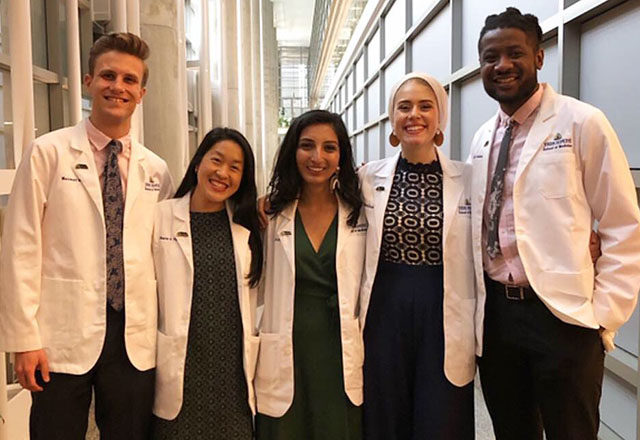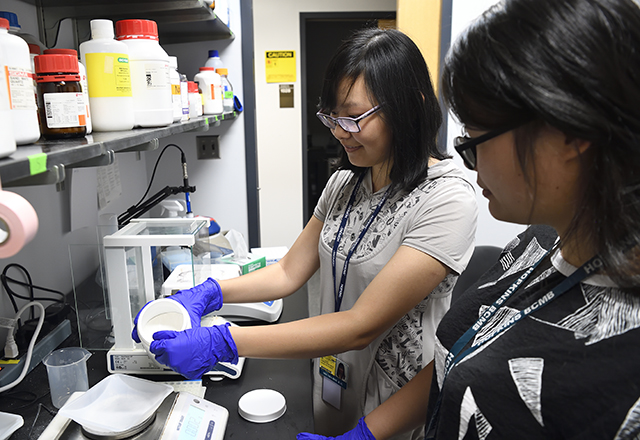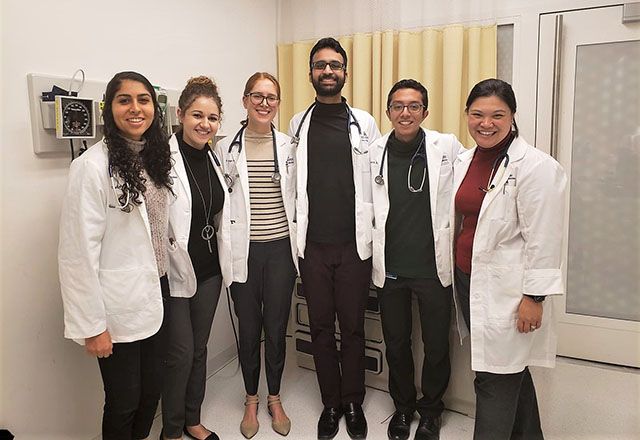Office of Financial Aid
Medical school can be a challenging proposition wherever you choose to enroll. But, the commitment Johns Hopkins makes to helping students manage the cost of their education can make a difference.
The Johns Hopkins School of Medicine is committed to providing financial assistance to all eligible students who qualify based on the availability of funds and demonstrated financial need. We work with each student to explore options for making a Johns Hopkins medical education possible.
I am applying for aid as a...
Financial Aid in Numbers
$40M
The amount administered in aid each year in the form of loans, grants, work, scholarship, and graduate funding support provided through federal, state, and institutional resources.
85%
The approximate amount of students who apply and receive some form of financial assistance to help pay toward their educational expenses.
Contact Information
Our team is ready to help you get the support you need quickly and easily. To get started, please request support through SEAM's online form.
For prospective or newly admitted students: https://support.sis.jhu.edu/new-account.
Office of Financial Aid
410-955-1324
Hours
8:30 a.m. - 4:30 p.m., Monday - Friday
Staff
- Jennifer Schleigh, Director of Financial Aid and Scholarships
- Genene Caines, Associate Director
- Nadjie Berhanu, Assistant Director
Our office is closed on University designated holidays and during inclement weather.
Surgical Services Timeline
It all starts with a phone call.

First, call 844-546-5645 for an initial intake interview via phone with a clinical specialist. This is your first point of contact with the clinical team, where you will review your medical history, discuss which procedures you’d like to learn more about and what is required, and develop a plan for next steps.
After intake, you'll receive next steps to schedule a consult appointment. Depending on your specific surgery, you'll likely need to prepare the following documentation:
- Mental Health Evaluations and Surgical Readiness referral letters from mental health providers documenting their assessment and evaluation
- Pharmacy records and medical records documenting your hormone therapy
- Medical records from your primary physician (these will be requested by the clinical team)
- Information about which prescription and over-the-counter medications you are currently taking
- Insurance information
Meeting with your surgeon.

The consult will be your first appointment with your new healthcare provider. These appointments typically include:
- Assessment of your medical health status and readiness for major surgical procedures;
- Discussion of your long-term gender affirmation goals and assessment of which procedures may be most appropriate to help you in your journey;
- Specific details about the procedures you and your surgeon identify, including the risks, benefits and what to expect after surgery.
After the consult, you'll receive next steps for scheduling the surgery.
Getting ready for surgery.
After your consult with the surgical team, you will receive information regarding next steps. Next steps can include a variety of things, to include:
- Medical Clearance tests and/or notes from other providers
- Additional imaging
- Updated mental health evaluation letters
- Hair removal, or other pre-operative readiness
Once all these things have been completed, you will receive a surgery date.
A preoperative anesthesia and medical evaluation.
Your surgeon may need to meet with you before surgery to finalize your surgical plan and go over any questions you may have before the morning of your procedure. You may also be asked to complete these evaluations at the hospital, which ensure that you are healthy enough for surgery.
Your surgery.

On the day of your procedure, you'll arrive at the hospital two hours prior to surgery. You will be brought back to the pre-op area where you'll change into a surgical gown and nursing staff will begin your check in. This involves asking questions, taking blood samples, starting an IV for fluids, and monitoring your vital signs with a blood pressure cuff and oxygen monitor.
In addition to the nurse that checks you in, you will see your surgeon, our PA, anesthesiologists, and possibly other surgical attending’s and surgical residents who assist in the operating room. Together everyone works as a team to ensure the best possible outcome.
Read FAQs for more information about what you can expect during your hospital experience at either the Johns Hopkins Outpatient Center or the Harry and Jeanette Weinberg Building.
What can you expect after gender affirming surgery?
For specific questions, please refer to the post-operative instructions you received from your surgical team.
If you have any of the following signs and symptoms, please call us: temperature greater than 101.5˚F; redness or rapidly changing shape of the surgical area; pus and/or large quantities of drainage from your incision or drain site; continuing inability to urinate; severe and unremitting pain not relieved by maximum doses of pain medications.
If you have any questions or concerns during regular business hours between 8:00 am and 5:00 pm, please call 844-546-5645 to reach the Center for Transgender and Gender Expansive Health. If you have questions or concerns after regular business hours, please call 410-955-5000 and ask for the “Plastic Surgery Resident On Call” to be paged. A doctor is available and present in the hospital 24/7/365 in case of emergencies.
For life-threatening symptoms such as shortness or breath, difficulty breathing, dizziness or fainting, chest pain, or mental status changes, call 9-1-1 or go to your nearest emergency department immediately.
We're here for you.

When you’ve finished the surgical aspects of your gender affirmation, we encourage you to follow up with your primary care physician to make sure that they have the latest information about your health. Your doctor can create a custom plan for long-term care that best fits your needs.
Among other changes, you may consider updating your name and identification. This collection of resources for transgender and gender-nonconforming individuals can help you in this process.




